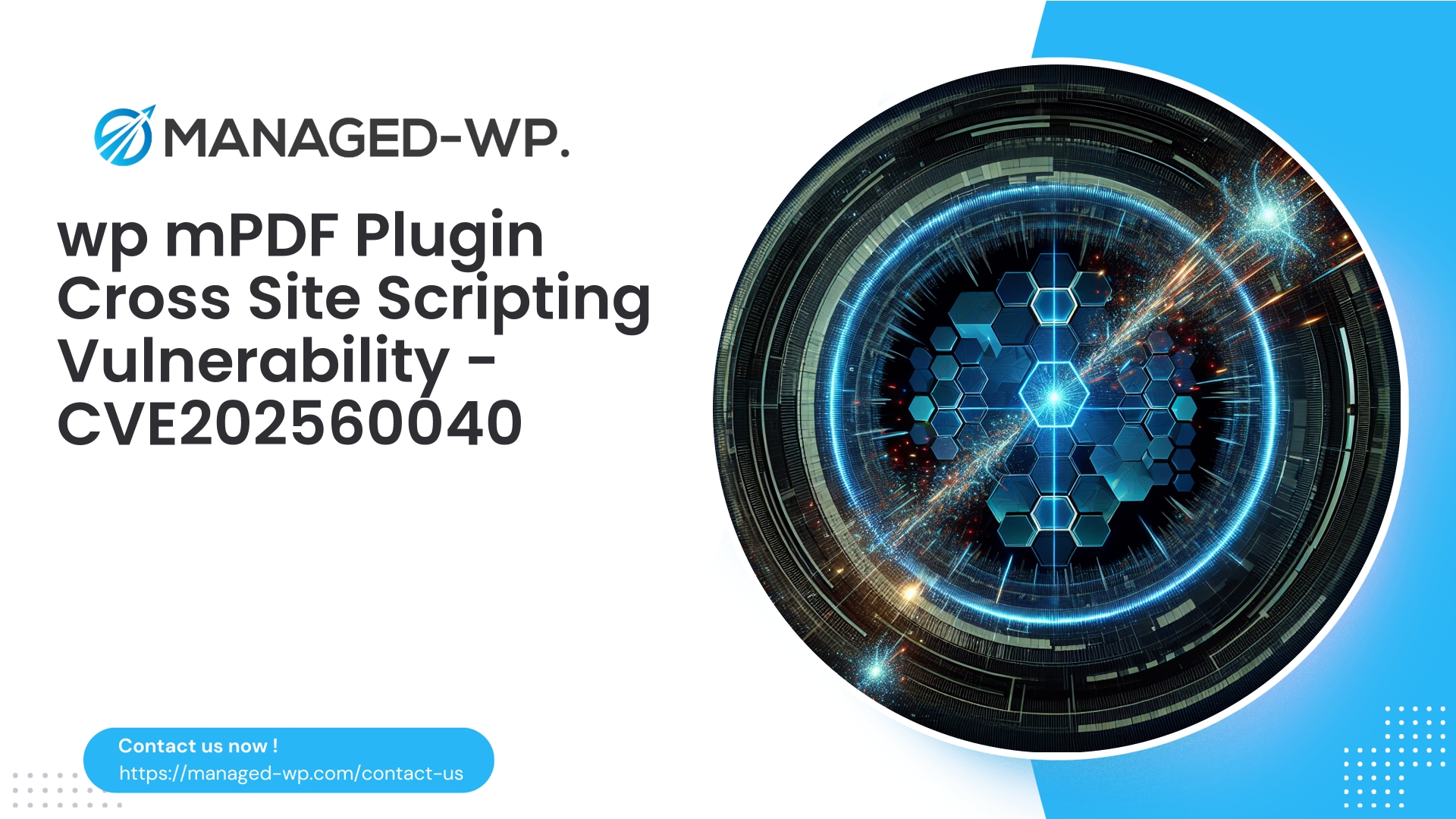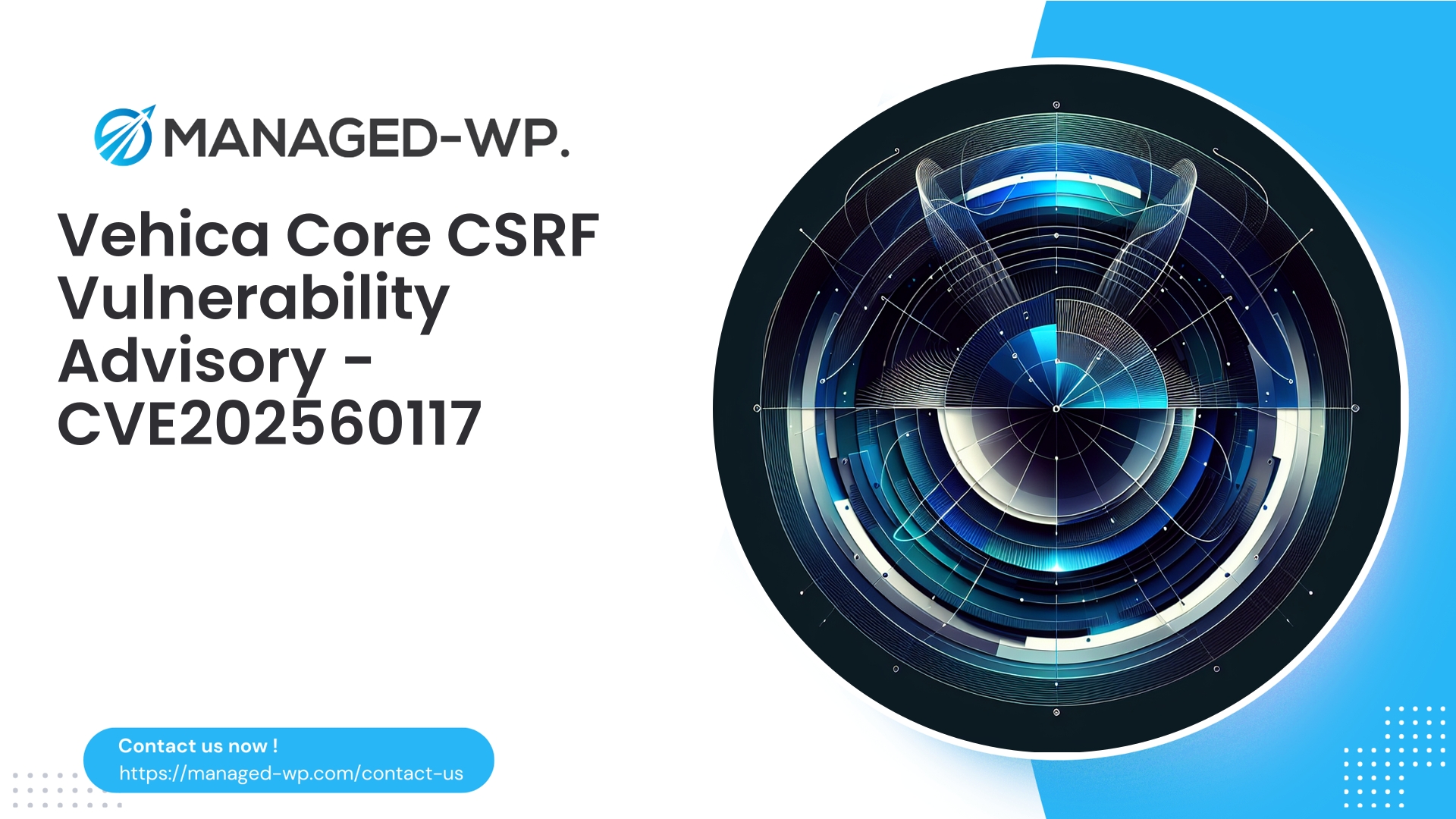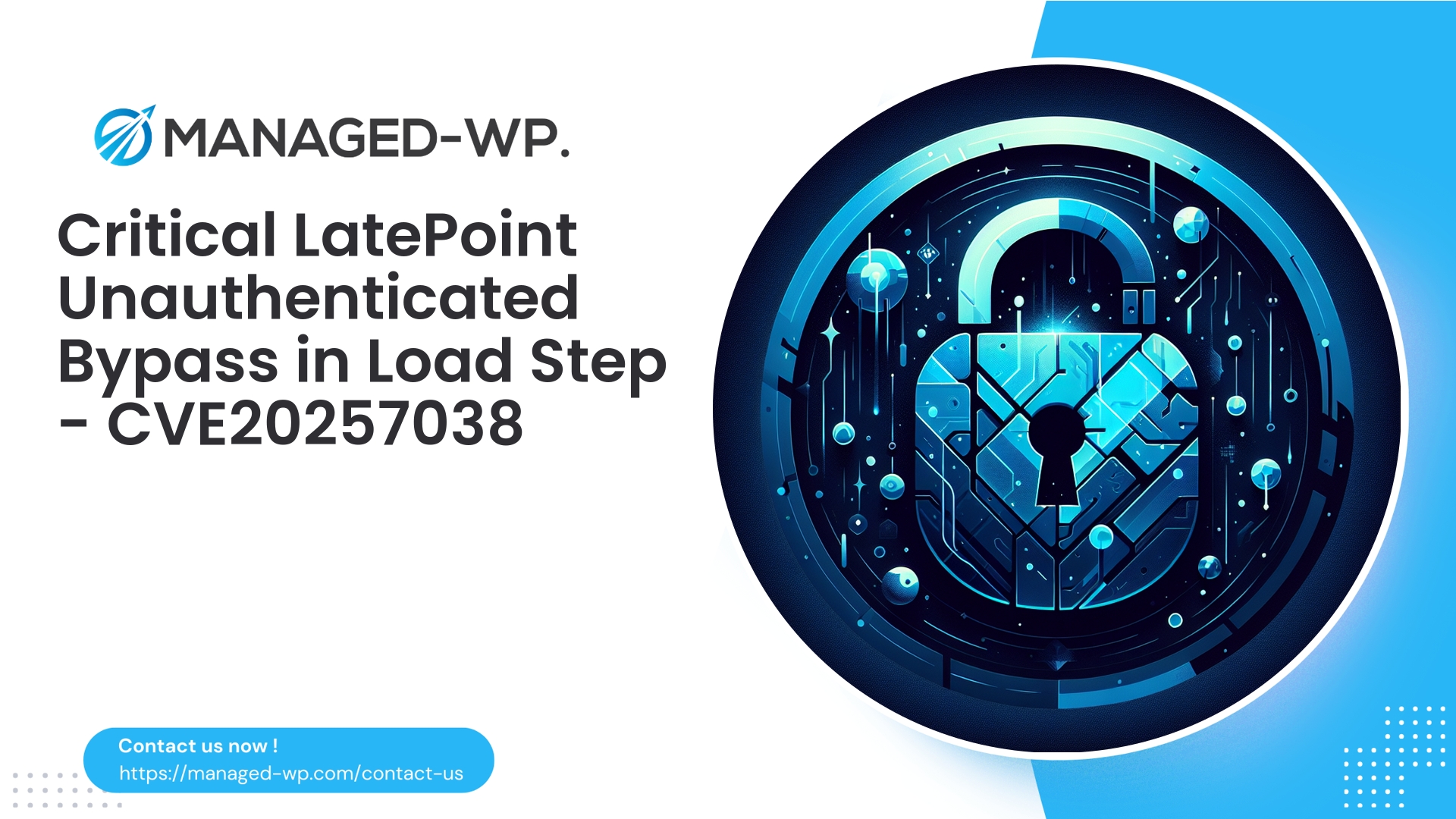| 插件名稱 | wp-mpdf |
|---|---|
| 漏洞類型 | 跨站腳本 (XSS) |
| CVE編號 | CVE-2025-60040 |
| 緊急 | 低的 |
| CVE 發布日期 | 2025-09-26 |
| 來源網址 | CVE-2025-60040 |
緊急通知:wp-mpdf ≤ 3.9.1 跨站腳本漏洞 (CVE-2025-60040) – WordPress 網站所有者應立即採取的措施
作者:Managed-WP 安全專家 | 日期:2025年9月26日
執行摘要
Managed-WP 的網路安全團隊發現了一個影響熱門 WordPress 外掛程式的跨站腳本 (XSS) 漏洞。 wp-mpdf 3.9.1 及更早版本(包括 3.9.1 版本)均有此漏洞 (CVE-2025-60040)。該漏洞已在 3.9.2 版本中修復。儘管此漏洞被歸類為低優先級,但 XSS 漏洞仍可能使攻擊者執行惡意腳本,從而導致會話被入侵、內容注入或權限提升。
本建議提供了全面的分析,包括風險分析、偵測策略、立即緩解措施(包括虛擬修補程式和防火牆規則)以及開發人員指導,以確保您的網站安全態勢保持強大。
筆記: 本文指南假定讀者已具備 WordPress 管理和核心安全實務的基本知識。
漏洞概述
- wp-mpdf 版本 ≤ 3.9.1 中存在 XSS 漏洞,漏洞編號為 CVE-2025-60040。
- 此漏洞允許在特定插件參數中註入惡意 JavaScript,從而允許在網站訪客或已認證使用者的上下文中執行腳本。
- 利用漏洞通常需要貢獻者等級或更高等級的權限。
- wp-mpdf 版本 3.9.2 中已發布官方補丁;強烈建議立即更新。
- 雖然公開的 CVSS 評分將其優先順序定為較低,但針對性攻擊和連鎖攻擊場景的利用風險仍然存在。
受影響方
- 所有啟用 wp-mpdf 外掛程式版本 ≤ 3.9.1 的 WordPress 網站都存在漏洞。
- 允許不受信任的貢獻者角色或向前端使用者揭露外掛程式功能的網站會增加其風險。
- 允許投稿者提交 HTML 內容的編輯工作流程網站尤其容易受到攻擊。
影響評估
- 攻擊向量: 持久型和反射型 XSS,可執行客戶端腳本。
- 潛在後果:
- 會話劫持和憑證竊取。
- 透過管理介面中的惡意腳本進行權限提升。
- 內容操縱導致網路釣魚或聲譽損害。
- 風險背景: 較低的緊急程度評級並不意味著風險可以忽略不計。攻擊者可以利用此漏洞結合其他攻擊手段。
立即採取的補救措施
- 立即建立網站檔案和資料庫的完整備份。
- 請立即將 wp-mpdf 插件更新至 3.9.2 版本。如果無法更新,請考慮卸載該插件。
- 透過 Web 應用程式防火牆 (WAF) 規則套用虛擬修補,以阻止針對該漏洞的惡意請求(規則範例如下)。
- 審核使用者角色-刪除或審查異常的貢獻者/編輯帳號並重設密碼。
- 掃描是否有入侵跡象,例如注入腳本、可疑貼文和意外的管理員使用者。
- 啟用 Web 伺服器、WAF 和外掛程式層級的日誌記錄和監控,以偵測攻擊嘗試。
- 對於多站點運營商,請在您的網路中統一部署更新和 WAF 規則。
安全性更新程式
- 透過 WordPress 控制面板:導覽至插件 → 已安裝插件,找到 wp-mpdf,然後選擇「立即更新」。
- 如果管理多個站點,請考慮專門為 wp-mpdf 啟用自動更新,或利用託管更新工具。
- 命令列:使用 WP-CLI
wp插件更新wp-mpdf加快更新速度。 - 更新後:清除頁面快取和 CDN 快取等快取層,以防止提供過時的程式碼。
虛擬修補程式和防火牆指南
當無法立即更新插件時,透過 WAF 實現強大的虛擬修補程式可以顯著降低風險。以下是 ModSecurity 和 Nginx+Lua 規則的實用範例。在強制執行規則之前,請在監控模式下測試所有規則,以最大程度地減少誤報。
ModSecurity 規則範本(請根據您的環境調整路徑和參數):
# 限制 wp-mpdf 外掛程式端點 SecRule REQUEST_URI "@rx /wp-content/plugins/wp-mpdf/|/wp-admin/admin-ajax.php" "id:100001,phase:1,t:none,pass,inGLitcol:glo=oneyGLitp. SecRule ARGS_NAMES|ARGS "@rx (title|content|mpdf_html|description|text|message)" "t:none,chain" SecRule ARGS|REQUEST_HEADERS|REQUEST_COOKIES "@rx (?i)(
Nginx + Lua 規則範例:
local args = ngx.req.get_uri_args() local suspect = {"
推薦的開發人員緩解措施
- 輸出編碼: 始終使用轉義輸出
esc_html(),esc_attr(), 或者wp_kses()使用嚴格控制的允許標籤。 - 輸入驗證: 採用白名單策略而非黑名單策略,實施嚴格的伺服器端驗證。
- 安全隨機數和權限: 驗證 nonce 值和使用者能力(例如,
檢查管理員引用者(),當前使用者可以())對所有操作。 - 將儲存的 HTML 清理: 使用
wp_kses_post()或對任何儲存的標記輸出採取更嚴格的要求。 - AJAX 端點處理: 對所有請求輸入進行清理和驗證;安全地返回 JSON 回應
wp_send_json_success()/wp_send_json_error().
用於清理儲存的 HTML 的程式碼片段範例:
。 $safe_html; ?>
檢測:識別剝削跡象
- 文章/頁面中存在不熟悉的腳本或 iframe 標籤。
- 意外或權限升級的管理員/貢獻者使用者帳戶。
- 可疑條目
wp_posts或者wp_postmeta包含腳本標籤或 XSS 有效載荷。 - 重定向、彈出視窗或前端內容注入的廣告。
- 主題、外掛程式或上傳目錄中的檔案變更。
- 防火牆日誌顯示多次腳本注入嘗試。
- 可疑的排程任務或出站 PHP 發起的連線。
使用 WP-CLI 搜尋可疑內容:
帶有腳本標籤的 # 文章 wp 資料庫查詢“SELECT ID, post_title FROM wp_posts WHERE post_content LIKE '%'
事件回應步驟
- 隔離受影響網站:啟用維護模式或限制公共存取。
- 保留日誌:匯出所有相關的伺服器、防火牆和應用程式日誌。
- 用來自可信任來源或備份的乾淨副本取代受損檔案。
- 重置所有憑證並輪換 API 金鑰。
- 徹底掃描上傳檔案和資料庫,尋找惡意腳本或後門。
- 修復完成後,更新所有軟體並啟用持續監控。
- 對於大規模資料外洩事件,應考慮尋求專業取證協助。
降低未來 XSS 風險的最佳實踐
- 對貢獻者和編輯角色強制執行最小權限原則。
- 實施可信任內容工作流程,並仔細清理所有使用者輸入。
- 部署嚴格的內容安全策略 (CSP) 以限制腳本執行來源。
- 使用安全性 cookie 標誌(僅限 HTTP、SameSite)來保護會話。
- 自動執行定期惡意軟體掃描和完整性檢查。
Managed-WP 如何保障您的安全
Managed-WP 為 WordPress 網站所有者和營運商提供先進的工具和專家指導:
- 客製化的託管WAF規則,可立即修復漏洞。
- 持續進行惡意軟體掃描和威脅偵測。
- 自動更新易受攻擊組件的插件。
- 為多站點管理員提供即時警報和集中式站點管理。
如果您已啟用 Managed-WP 服務,請立即啟用 wp-mpdf 的虛擬修補規則,以便在協調更新時最大限度地減少風險。
正在驗證您的插件狀態
- 透過 WP 管理背景:外掛程式 → 已安裝外掛程式 → 確認 wp-mpdf 是否存在及其版本。
- 透過 WP-CLI:
wp plugin list --status=active --format=tablewp plugin get wp-mpdf --field=version
如果版本為 3.9.1 或更低,請立即更新。
建議的補救時間表
第 0 天(揭露): 審核外掛程式版本;在無法立即更新的情況下部署 WAF 規則。
第 1-3 天: 廣泛部署更新;掃描是否有被利用的跡象;必要時輪換憑證。
第 4-7 天: 審查日誌以發現攻擊企圖;加強 CSP 和 cookie 策略;與利害關係人溝通。
進行中: 保持主動掃描、防火牆調優和編輯工作流程強化。
內容清理範例 SQL(運行前備份)
查詢以查找可能包含 XSS 攻擊漏洞的貼文:
SELECT ID, post_title FROM wp_posts WHERE post_content LIKE '%
查詢以尋找可疑的帖子元資料條目:
SELECT meta_id, post_id, meta_key FROM wp_postmeta WHERE meta_value LIKE '%
只有在完成完整備份和離線分析後,才能刪除或清除惡意內容。
溝通準則
- 所有補救措施均需內部記錄。
- 對於已確認的違規行為,應遵守所有法律揭露要求並聘請法律顧問。
- 對外傳達的訊息應該清晰明了,但要避免包含可能幫助攻擊者的技術細節。
常見問題解答
問: CVSS評分較低;這是一個嚴重的問題嗎?
一個: 是的。 XSS攻擊通常是更具破壞性攻擊的跳板——而貢獻者層級的存取權限會顯著降低攻擊者的門檻。
問: 瀏覽器保護措施是否足夠?
一個: 不。最好的防禦手段是依賴伺服器端修復和WAF保護。
問: 嚴格的防火牆規則會導致網站問題嗎?
一個: 因此,在強制執行之前,應仔細調整規則並在監控模式下進行驗證。
ModSecurity 規則調整說明
- 分配唯一的規則 ID(使用 10000 以上的範圍)。
- 在適用情況下,請排除受信任的 IP 位址。
- 在監控模式下使用「nolog」指令,可以在阻止流量之前先查看流量。
- 請聯絡您的主機提供者或 Managed-WP 支援團隊以取得部署方面的協助。
最終建議
儘管優先順序較低,但主動更新至 3.9.2 版本並套用虛擬修補程式對於保護您的網站至關重要。請保持嚴格的使用者權限管理,並持續清理所有使用者產生的內容,以大幅降低 XSS 風險。
請記住:揭露後採取強有力的及時措施可以防止攻擊者站穩腳跟,並保護您的 WordPress 生態系統免受不斷升級的威脅。
立即開始使用 Managed-WP 的免費安全性計劃
為了獲得可靠、持續的保護,同時還能管理更新和事件回應,不妨考慮 Managed-WP 的免費基礎套餐——該套餐包含託管防火牆 (WAF)、惡意軟體掃描、OWASP Top 10 緩解措施以及無限頻寬。只需極少的設定即可建立強大的安全基線。了解更多: https://my.wp-firewall.com/buy/wp-firewall-free-plan/
需要客製化的防護措施? Managed-WP 支援團隊可以協助您產生並部署專門針對 wp-mpdf 使用情況最佳化的 ModSecurity 規則——這些規則已在監控模式下針對您的實際流量進行測試。聯絡支援團隊或在 Managed-WP 控制面板中啟用虛擬補丁,即可立即降低風險。



















